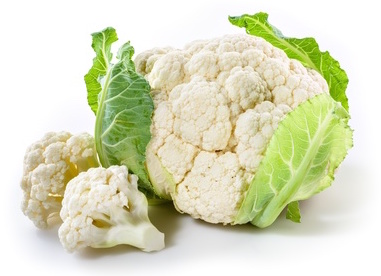
Health Benefits:
Anti viral qualities
Detoxifying effects
Increases stamina
May reduce risk of cancer
May regulate heart rate
Pain reliever
Provides energy
Reduces risk of breast cancer
Reduces risk of lung cancer
Reduces risk of prostate cancer
Nutrition:
Serving size: 1 cup chopped; Calories: 27; Fat: .3g; Cholesterol: 0mg; Sodium: 32mg; Carbs: 5g; Fiber: 2.5g; Sugars: 2g; Protein: 2g; Potassium: 9%DV; Vitamin A: 0%DV; Vitamin C: 85%DV; Calcium: 2%DV; Iron: 2%DV
Did You Know?
- Fresh cauliflower is a rich source of vitamins C, K, B6, B5, B1, and minerals like manganese, copper, iron, calcium, and potassium.
- Cauliflower is actually a flower that hasn't fully developed yet!
Ways to Eat:
- Baked
- Fried
- Mashed
- Roasted
- In soup
- Steamed
- Riced
Farming Trivia:
- Cauliflower is in the same family as broccoli, Brussels sprouts, collards, rutabagas, turnips, kale, and kohlrabi.
- Cauliflower has to have consistently cool temperatures, so almost 3/4 of commercial cauliflower is grown in the coastal valleys of California.
- While the leaves are edible, they have a stronger taste than the florets.
Note: Always consult a physician for any specific health questions and concerns. Some of this information may be subject to change should there be any new findings from Federal Health Administration (FHA), Food & Drug Administration (FDA), American Medical Association (AMA), American Cancer Society (ACS), and / or other leading food, nutrition and medical advisors.

